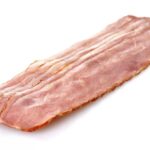Turkey sausages are frequently considered a healthier alternative to traditional sausage varieties.
However, would labeling them as ‘healthy turkey sausages’ be an accurate description?
This article delves into turkey sausages’ nutritional values, benefits, and downsides.
Are they a healthy choice?
Table of contents
- What Are Turkey Sausages Made Of?
- What Nutritional Values Do They Have?
- How Do Turkey Sausages Compare To Traditional Pork Sausages?
- Nutritional Benefits of Turkey Sausages
- Potential Downsides
- How Do Turkey Sausages Compare To Other Protein Sources?
- Commonly Asked Questions
- Are Turkey Sausages Good For You?
What Are Turkey Sausages Made Of?

Turkey sausages generally feature ingredients resembling traditional pork sausages; the main difference is the type of meat used.
However, it is important to remember that that no two sausage products are exactly alike, and the ingredients will vary from brand to brand.
Typical Ingredients Profile
According to the USDA’s FoodData Central database, let’s examine the ingredient profile of a typical turkey sausage product (1):
- Turkey
- Water
- Salt
- Flavorings
- Dextrose
- Smoke flavoring
- Sodium erythorbate
- Sodium nitrite
- Pork casing
The salt, flavorings, dextrose, and smoke flavoring function as seasonings and flavor enhancers.
In contrast, sodium nitrite operates as a preservative that enhances flavor and imparts a reddish-pink color to the meat (2).
Sodium erythorbate, on the other hand, acts as an antioxidant, helping to prevent fat oxidation and inhibiting bacterial growth (3, 4, 5).
Once again, it is important to reiterate that the presence of these ingredients may vary across different turkey sausage products. Likewise, some products may contain additional ingredients not detailed here.
What Nutritional Values Do They Have?
The subsequent tables display nutritional values per 57-gram cooked turkey sausage. All nutritional data is drawn from the USDA’s FoodData Central database (6).
Daily values are based on a 2000-calorie diet and were calculated by combining the USDA data with the FDA’s published daily values (7).
| Name | Amount | % Daily Value |
|---|---|---|
| Calories | 112 kcal | |
| Carbohydrates | 0 g | 0% |
| Fiber | 0 g | 0% |
| Sugars | 0 g | |
| Fat | 5.93 g | 7.6% |
| Saturated | 1.29 g | 6.5% |
| Monounsaturated | 1.7 g | |
| Polyunsaturated | 1.54 g | |
| Omega-3 | 0.09 g | |
| Omega-6 | 1.38 g | |
| Protein | 13.6 g | 27.2% |
| Cholesterol | 52.4 mg | 17.5% |
Vitamins
| Vitamin | Amount | % Daily Value |
|---|---|---|
| Choline | – | – |
| Folate | 3.42 mcg | 0.9% |
| Vitamin A, RAE | 7.41 mcg | 0.8% |
| Vitamin B1 (thiamin) | 0.05 mg | 4.2% |
| Vitamin B2 (riboflavin) | 0.15 mg | 11.5% |
| Vitamin B3 (niacin) | 3.26 mg | 20.4% |
| Vitamin B5 (pantothenic acid) | 0.62 mg | 12.4% |
| Vitamin B6 (pyridoxine) | 0.18 mg | 10.6% |
| Vitamin B12 (cobalamin) | 0.70 mcg | 29.2% |
| Vitamin C | 0.40 mg | 0.4% |
| Vitamin D | – | – |
| Vitamin E | 0.10 mg | 0.7% |
| Vitamin K | 0.86 mcg | 0.7% |
Minerals
| Mineral | Amount | % Daily Value |
|---|---|---|
| Calcium | 12.54 mg | 1.0% |
| Copper | 0.08 mg | 8.9% |
| Iron | 0.85 mg | 4.7% |
| Magnesium | 11.97 mg | 2.9% |
| Manganese | 0.01 mg | 0.4% |
| Phosphorus | 115.14 mg | 9.2% |
| Potassium | 169.86 mg | 3.6% |
| Selenium | – | – |
| Sodium | 379.05 mg | 16.5% |
| Zinc | 2.21 mg | 20.1% |
How Do Turkey Sausages Compare To Traditional Pork Sausages?
Compared to traditional pork sausages, turkey sausages have notable nutritional differences.
Given turkey’s lower fat content in comparison to pork, turkey sausages naturally contain fewer grams of fat. As a result, this translates to a reduced calorie count and proportionately higher protein content.
The following table elucidates the basic nutritional makeup of these two sausage varieties per 100 grams (6, 8):
| Name | Turkey sausages | Pork sausages |
|---|---|---|
| Calories | 196 kcal | 396 kcal |
| Carbohydrates | 0 g | 2.7 g |
| Fiber | 0 g | 0 g |
| Sugars | 0 g | 0 g |
| Fat | 10.4 g | 36.2 g |
| Saturated | 2.27 g | 13.0 g |
| Monounsaturated | 2.99 g | 17.2 g |
| Polyunsaturated | 2.71 g | 3.9 g |
| Omega-3 | 0.17 g | 0.32 g |
| Omega-6 | 2.38 g | 3.46 g |
| Protein | 23.9 g | 13.8 g |
| Cholesterol | 92 mg | 71 mg |
| Sodium | 665 mg | 929 mg |
The table demonstrates that turkey sausages have significantly higher protein content, approximately half the calorie count, and notably lower fat content.
For more comparisons between different types of sausages, including low-sodium options, refer to this comprehensive guide:
18 Different Types of Sausages: Varieties & Nutritional Values
Nutritional Benefits of Turkey Sausages
Highlighted below are some key nutritional benefits of turkey sausages:
- Protein density: Turkey sausages are a lean protein choice, offering 13.6 grams of protein for only 112 calories in a single sausage (6).
- Low in calories: As the previous comparison section demonstrates, turkey sausages boast half the caloric content of traditional sausages. This makes them an appealing choice for weight management and lean protein intake.
- Lower saturated fat content: Turkey sausages have a relatively low saturated fat content. With approximately 2.23 grams per 100 grams, this contrasts significantly with the approximate 13 grams in traditional pork sausages (6, 8). Elevated saurated fat intake can lead to higher levels of LDL-C (low density lipoprotein cholesterol), recognized as a cardiovascular disease risk factor (9, 10). Notably, turkey sausages even have a lower saturated fat content than plant-based alternative sausages like Beyond Sausage.
- Micronutrient provision: Turkey sausages provide high levels of B vitamins, particularly niacin and vitamin B12. They are also an excellent source of zinc, with a single sausage providing approximately 20% of the daily value (6, 7).
- A versatile ingredient: Turkey sausages adapt well to a diverse range of recipes. They can be grilled, stir-fried, pan-fried, roasted, used as a pizza topping, added to pasta and rice-based dishes, used in soups and stews, and more.
Potential Downsides
Despite their nutritional merits, turkey sausages present several potential downsides.
The most notable of these are listed below:
- High sodium content: While ‘lower sodium’ options are available, most turkey sausages contain a significant amount of salt. For instance, a single sausage provides 379 mg of sodium, translating to 16.5% of the recommended daily value (6, 7). This means that they may not be suitable for individuals following a low-sodium diet.
- Not as flavorful: Some people complain that the flavor of turkey sausages isn’t as flavorful or as juicy as traditional pork sausages. This contrast primarily stems from their significantly lower fat content.
- May contain allergens: Turkey sausages may sometimes contain allergens among their ingredients (11). For example, some brands may include additives that contain gluten, such as seasoning mixes incorporating wheat products. Anyone with an allergy or a gluten sensitivity should examine the ingredient label carefully to ascertain the full ingredients profile.
- May contain nitrates or nitrites: like many processed meats, turkey sausages can contain sodium nitrate and/or sodium nitrite. These ingredients function as preservatives to prevent bacterial growth. However, they can also potentially lead to the formation of compounds called nitrosamines, which are potential carcinogens (12, 13, 14). If choosing to limit nitrates and nitrites, check the ingredients label to confirm these preservatives aren’t present. Research suggests that consuming vitamin C and bioactive components of plant foods may help to mitigate nitrosamine formation when consumed alongside a dietary source of nitrate or nitrite (15, 16).
How Do Turkey Sausages Compare To Other Protein Sources?
Previously, we explored the nutritional advantages of turkey sausages in comparison to pork sausages.
However, other protein sources like turkey, chicken, and lean meats can offer even higher protein and lower calorie content than turkey sausages.
Furthermore, these other protein sources don’t incorporate additives and preservatives.
Turkey sausages present a superior protein-to-calorie ratio compared to many plant-based protein sources.
However, exceptions to this include seitan and extra firm tofu, which have additional and comparable protein content, respectively.
Commonly Asked Questions
Lastly, here are some commonly asked questions concerning turkey sausages.
Yes, since the primary ingredient is turkey, turkey sausages provide a good range of vitamins and minerals, similar to turkey meat. Among these nutrients, turkey sausages yield high levels of B vitamins and zinc.
The answer to this question depends on the specific turkey sausage brand and the ingredients it contains. It is important to check the label carefully to confirm the absence of gluten sources.
According to the USDA database, a 57-gram cooked turkey sausage holds 379.05 mg of sodium (6). However, it is important to remember that nutritional databases present average values. In other words, the amount of sodium can vary depending on the specific brand, ingredients list, and production process.
Turkey sausages contain significantly fewer calories owing to their lower fat content. Thus, replacing traditional pork sausages with turkey sausages could contribute to weight management, all else equal. Grilled, the sausages provide a lean source of protein. However, as with any food, portion size is still important. Additionally, weight loss hinges on the overall dietary pattern and total calorie intake relative to energy requirements.
Are Turkey Sausages Good For You?
As illustrated throughout this article, turkey sausages offer several beneficial attributes.
These benefits encompass their protein and nutrient density, alongside nutritional advantages when compared to traditional sausages. Specifically, they deliver more protein for significantly fewer calories.
Conversely, turkey sausages share the same potential downsides as other processed meats. These downsides involve their high sodium content and possible inclusion of sodium nitrate or sodium nitrite.
Considering these factors, turkey sausages may be deemed a “healthier” choice than traditional pork sausages. However, it is fair to say unprocessed meats are a better choice nutritionally.








